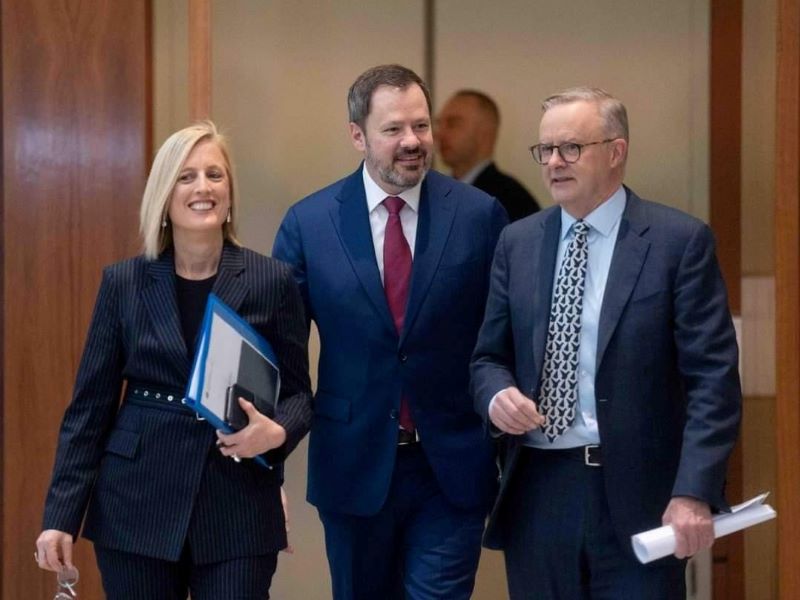The Albanese government’s flagship $15 billion National Reconstruction Fund will be created after enabling legislation passed the Senate late on Tuesday evening following a debate in which 20 amendment sheets were voted on.
With the support of the Greens secured before the bill passed through the House of Representatives, the government secured support from the Jacqui Lambie Network, as well as independent Senators Lidia Thorpe and Senator David Pocock earlier on Tuesday.
The successful crossbench amendments go to the size, term and composition of the National Reconstruction Fund (NRF) board, although most of the proposed amendments did not pass. All of the Opposition’s amendments were rejected.
The amended bill will now return to the House of Representatives, where the government holds a majority of the seats. It is expected to be officially legislated on Wednesday.

The bill establishes the NRF Corporation, which will administer the $15 billion industry fund. It will be directed by an independent board whose members will be appointed by Industry and Science minister Ed Husic and Finance minister Katy Gallagher.
In a statement, Mr Husic described the fund as “one of the largest peacetime investments in Australian manufacturing capability”.
“The most successful modern economies are built on strong, advanced manufacturing capability. The NRF will help deliver this for Australia,” he said.
“We genuinely wanted this bill to be a moment where Parliament came together to support the national interest. I am pleased the crossbench engaged constructively on this important bill that will help rebuild Australia’s sovereign capability.”
Mr Husic said the fund – one of Labor’s key election commitments – will “position Australia as a maker of high-value added products and creating good secure jobs in the process.”
“The NRF shows the Government is serious about investing our human capital to keep Australian smarts on shore. We want Australia to be a country that makes things, a nation that has faith in its know-how and ability to get the job done,” he said.
With the bill to be signed off by the House of Representatives, Mr Husic and Ms Gallagher will shortly develop an investment mandate that will guide the investments of the NRF Board. The mandate will include an agreed rate of return.
According to a government amendment to the bill in the Senate, the board must also have regard to six other considerations such as “the desirability of encouraging the commercialisation of Australian innovation and technology”, “the desirability of creating secure jobs and a skilled and adaptable workforce”, and Australia’s greenhouse gas emissions reduction targets.
The government’s other Senate amendment also requires the NRF Corporation to produce a written policy on the “impact of investments of the Corporation on First Nations Australians”.
Investments through the NRF may be made through loans, credit, bond or other debt security purchase, guarantees, or the acquisition of equity interests. Grant funding will not be made through the NRF.
The government has committed to seven sub-funds within the NRF, the largest of which is an up to $3 billion sub-fund for renewables and low emissions technologies. The other priority areas are for medical science, transport, value-add in agriculture, forestry and fisheries, value-add in resources, defence capability, and enabling capabilities or ‘critical technologies’.
Just one of Jacqui Lambie Network Senator Tammy Tyrell’s three NRF amendment sheets passed. Senator Tyrell’s amendments increases the minimum and maximum NRF board membership by two – to six and eight respectively – and specifically highlights ‘the commercialisation of innovative research’ as an appropriate area of expertise for a board member.
The legislation also requires the ministers to ensure the board members “have an appropriate balance of experience or expertise, professional credibility and significant standing” within their fields.
Speaking to the amendment on Monday evening, Senator Tyrell said this would prevent the possibility that the board become dominated by members of a single profession, for example.
Senator Pocock had one of his three NRF amendment sheets pass. The amendments reduce the maximum term for NRF board members from five years to four years, with the option for an additional term of reappointment. This sheet also brings forward the date of the first review of the fund from five years after passage to before 31 December 2026.
Two second reading amendments also passed. These are not included in the NRF Corporation bill itself.
Greens Senator Peter Whish Wilson secured a call for the NRF to support circular economy projects and to incorporate circular economy principles in the fund’s investment mandate.
Senator Pocock’s , meanwhile, received a commitment from government to explore policy mechanisms for financing startups, as well as establishing a presence for the Corporation in the Australian Capital Territory.
None of Senator Thorpe ‘s amendment sheets or second reading amendment passed. A requirement that consent be obtained from First Nations Traditional Owners before projects situated on their land could receive NRF investment from was pursued as an amendment to the bill as well as a call for inclusion in the Investment Mandate through a second reading amendment.
Do you know more? Contact James Riley via Email.

